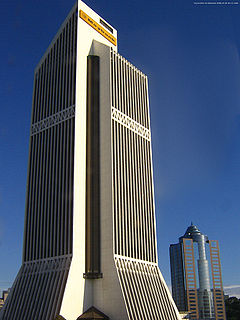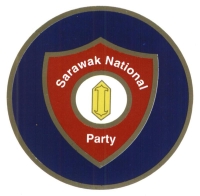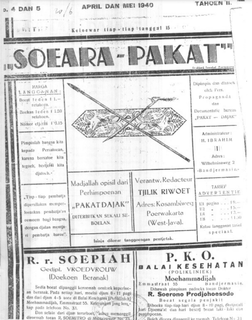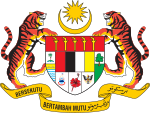
The Sarawak Native People's Party or Malay: Parti Bansa Dayak Sarawak (PBDS) was a political party in the state of Sarawak in Malaysia. It was established in 1983, by Datuk Amar Leo Moggie Irok, after seceding from Sarawak National Party (SNAP) following his loss in the contest for the SNAP's president post against Datuk Amar James Wong Kim Ming.

Parti Pesaka Bumiputera Bersatu is a right-wing political party in Malaysia. It is currently the largest political party in Sarawak. Parti Pesaka Bumiputera Bersatu was formed from the combination of three parties in Sarawak; Parti Negara Sarawak, Barisan Rakyat Jati Sarawak and Parti Pesaka Anak Sarawak. The formation of the party was for the purpose of the improvement of the livelihood and protect the rights of the Bumiputera in many fields such as politics, economy and social. Following the fall of BN in the 2018 general election and in the aftermath of a meeting between all Sarawak-based BN coalition parties on 12 June 2018, PBB left the coalition to formed a new Sarawak-based coalition, Sarawak Parties Alliance.

Tun Datuk Patinggi Haji Abdul Rahman bin Ya'kub was a Malaysian politician of Melanau descent from Mukah. He was the third Chief Minister of Sarawak and the fourth Yang di-Pertua Negeri Sarawak. He is also an uncle of Pehin Sri Abdul Taib Mahmud, since his (Taib's) mother Hajah Hamidah Ya'akub (1916–2006) was his (Rahman's) eldest-born sibling.

This article lists important figures and events in Malaysian public affairs during the year 1987, together with births and deaths of notable Malaysians.

Abdul Taib bin Mahmud is a Malaysian politician who has served as the 7th Yang di-Pertua Negeri of Sarawak since March 2014. He served as the 4th Chief Minister of Sarawak for 33 years, from March 1981 to February 2014, making him the longest-serving head of government of a Malaysian state. He served as President of the Parti Pesaka Bumiputera Bersatu (PBB), which was part of the Barisan Nasional coalition until 2018. He is of ethnic Melanau descent.

The Sarawak National Party known by its acronym as "SNAP", is now a defunct political party in Malaysia. It was a member party of the Alliance Party from 1963 to 1966 and a member of Barisan Nasional (BN) coalition from 1976 until its expulsion in 2004. It contested the General Election in 2004 as well as the Sarawak state elections of 2006 and 2011 as an opposition party.
Tun Datuk Patinggi Temenggong Jugah anak Barieng, also known as Tun Jugah, was a Malaysian politician of Iban descent from the state of Sarawak. He was the Paramount Chief of the Iban people for more than 55 years. They affectionately called him "Apai" meaning "father" in the Iban language.

The fourth Sarawak state election was held between Wednesday, 28 December and Thursday, 29 December 1983 with a nomination date on Thursday, 8 December 1983. The two-day duration of the election was shorter than the eight-day election in 1979 state election because of improvements in transportation and communication systems. Only 45 out of 48 seats were contested. The state assembly was dissolved on 18 November 1983 by the governor of Sarawak with the advice of chief minister of Sarawak, which was one year and 15 days earlier than the expiration of the state assembly on 3 December 1984.
Wahab Bin Dolah is a Malaysian politician. He was the Member of the Parliament of Malaysia for the Igan constituency in Sarawak, representing the United Traditional Bumiputera Party (PBB) in the ruling Barisan Nasional coalition.

Ahmad Zaidi Adruce bin Muhammed Noor was the fifth Yang di-Pertua Negeri of Sarawak. He was the longest-serving governor of Sarawak, from his inaugural in 1985, to his death in 2000. He was also remembered as the first Sarawakian Bumiputera to receive a MA Degree from a British university.

The sixth Sarawak state election was held between Friday, 27 September and Saturday, 28 September 1991. This election elected 56 state representatives into the Sarawak State Assembly. This election saw 72.8% of the eligible voters to cast their votes.
The Darjah Yang Amat Mulia Bintang Kenyalang Sarawak is the second highest order group of the orders, decorations, and medals of Sarawak. The order was instituted in 1970, and was redesigned in 1988. Two more ranks were added to the order: the 'Officer' in 1988 and the 'Companion' in 2002.

The Sarawak Foundation, also known as Yayasan Sarawak is a statutory body set up to help improve the quality of education of Sarawak. It is often associated with the provision of scholarships and study loans.
The Samariang Muslim Cemetery is the largest Muslim cemetery in Kuching city, Sarawak, Malaysia. It is located near Kampung Samariang near Petra Jaya. It is the final resting place of many prominent Malay Sarawakian personalities.

Pehin Sri Tan Sri Haji Adenan bin Haji Satem, popularly known as Tok Nan, was a Malaysian politician who served as the fifth chief minister of Sarawak from March 2014 to his death in January 2017. During his tenure, Adenan held the position as the President of Parti Pesaka Bumiputera Bersatu (PBB), which is part of the Barisan Nasional coalition. He was of Malay descent.

The Ming Court Affair was a political coup in Sarawak, Malaysia that began in 1983, developed into a full-blown political crisis during 1987 state election, and ended after the Sarawak Malaysian People's Association (PERMAS) was dissolved in 1991. This political crisis mainly involved in the dispute between Abdul Rahman Ya'kub and his nephew Abdul Taib Mahmud over the control of the state government and Sarawak's natural resources.

The fifth Sarawak state election was held between Wednesday, 15 April and Thursday, 16 April 1987 with a nomination date set on Monday, 6 April 1987. This was a snap election following the 'Ming Court' affair. The state assembly was dissolved on 12 March 1987 by Sarawak governor with the advice of chief minister of Sarawak, Abdul Taib Mahmud.

Tan Sri Datuk Patinggi Abang Haji Abdul Rahman Zohari bin Tun Datuk Abang Haji Openg, familiarly known as Abang Jo or Abang Johari, is a Malaysian politician who has served as the first Premier of Sarawak since March 2022 and Member of the Sarawak State Legislative Assembly (MLA) for Gedong since December 2021. He served as the sixth and last Chief Minister of Sarawak from January 2017 before the title was changed to premier in March 2022. He was also the MLA for Satok from May 1981 to December 2021.

Dayak in politics refer to the participation of Dayaks to represent their political ideas and interest outside of their community. The movement has continued to contribute a profound impact towards the development of Indonesia and Malaysia, especially in Kalimantan and Sarawak.













